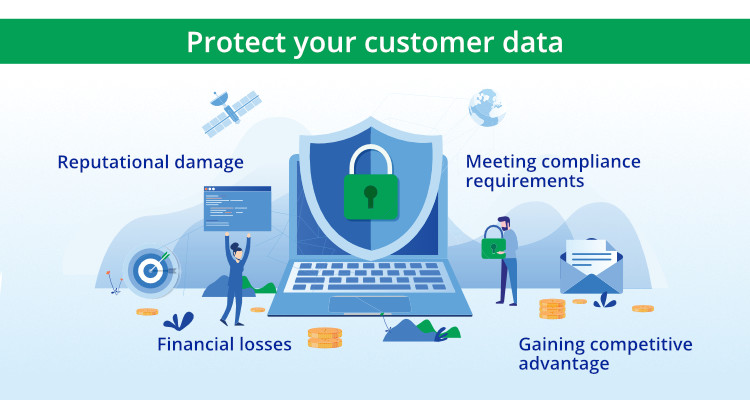Customer data privacy and security are crucial parts of every organization’s business strategy, regardless of the sector. Every customer with whom an enterprise interacts brings with them a spate of personally identifiable information (PII). It is the organization’s responsibility to have a robust security system for the protection of that data.
With the advent of digital transformation, data-driven insights are crucial to the growth of any enterprise, and consumer data is extremely valuable in this context. This has, however, also led to a drastic increase in cybercrime in the past decade. According to a recent study from Atlas VPN, cybercriminals make an average of $1.5 trillion every year. Since the number of cybercrimes increases exponentially every year, protecting customer data is now more critical than ever.
Let us look at some of the reasons why protecting consumer data is so critical.
Reputational damages: Customer trust and reputational damage are interconnected, especially when it comes to data breaches. The importance of privacy and robust security practices are the backbone of the trust consumers have in an organization. From negative media coverage to loss of customers, the repercussions of a data breach are unimaginable, especially in today’s digitally connected world. According to a 2019 survey, 81% of respondents said they would stop engaging with the brand after a data breach.
Meeting compliance requirements: There are strict laws regarding adhering to compliance when dealing with customers’ personal information. Policies like General Data Protection Regulation (GDPR) governs how data is protected in the European Union, and the California Consumer Privacy Act (CCPA) does the same for consumers in the US state of California. Similarly, in the context of the healthcare industry, there are Protected Health Information (PHI) requirements as per the Health Insurance Portability and Accountability Act (HIPAA). Not adhering to these compliance regulations can lead to organizations being levied huge fines that may sometimes run to even millions of dollars.

Financial losses: A March 2020 study by FTI Consulting shows that organizations have suffered almost a 9% drop in the annual turnover due to a data breach. A data breach would shake the confidence of the brand’s customers and decrease investor confidence and affect the organization’s business relationships. Between 2015 and 2019, Dunkin’ Donuts was the victim of a massive data breach that compromised names, email addresses, and DD account numbers of nearly 20,000 customers. The company had to agree to pay $650,000 as penalty costs for its inadequate response to the breach.
Gaining competitive advantage: A majority of individuals with online habits indicated that they had significant concerns about their personal data being misused. While maintaining data privacy is essential for various reasons, one of the less obvious (but equally important) reasons is to gain an advantage over the competition. Organizations that are perceived as more trustworthy with data safeguards in place tend to have robust privacy practices that limit consumer information sharing.
According to a recent report by McKinsey, the degree of trust consumers have in a brand increases if it limits the use of personal data, reacts quickly to hacks and breaches, and actively discloses such mishaps to the public. Organizations should have transparent privacy policies that inform their customers when they collect personal information, how the data will be used, and who will process it. In case of any breaches, businesses must devise a strategy on real-time decision-making to deal with the crisis and an action plan to communicate details of the breach to its stakeholders. As technology advances, organizations should implement the latest cybersecurity best practices, ensure compliance to regulations, and adopt effective resilience strategies while continuing to update their systems.





